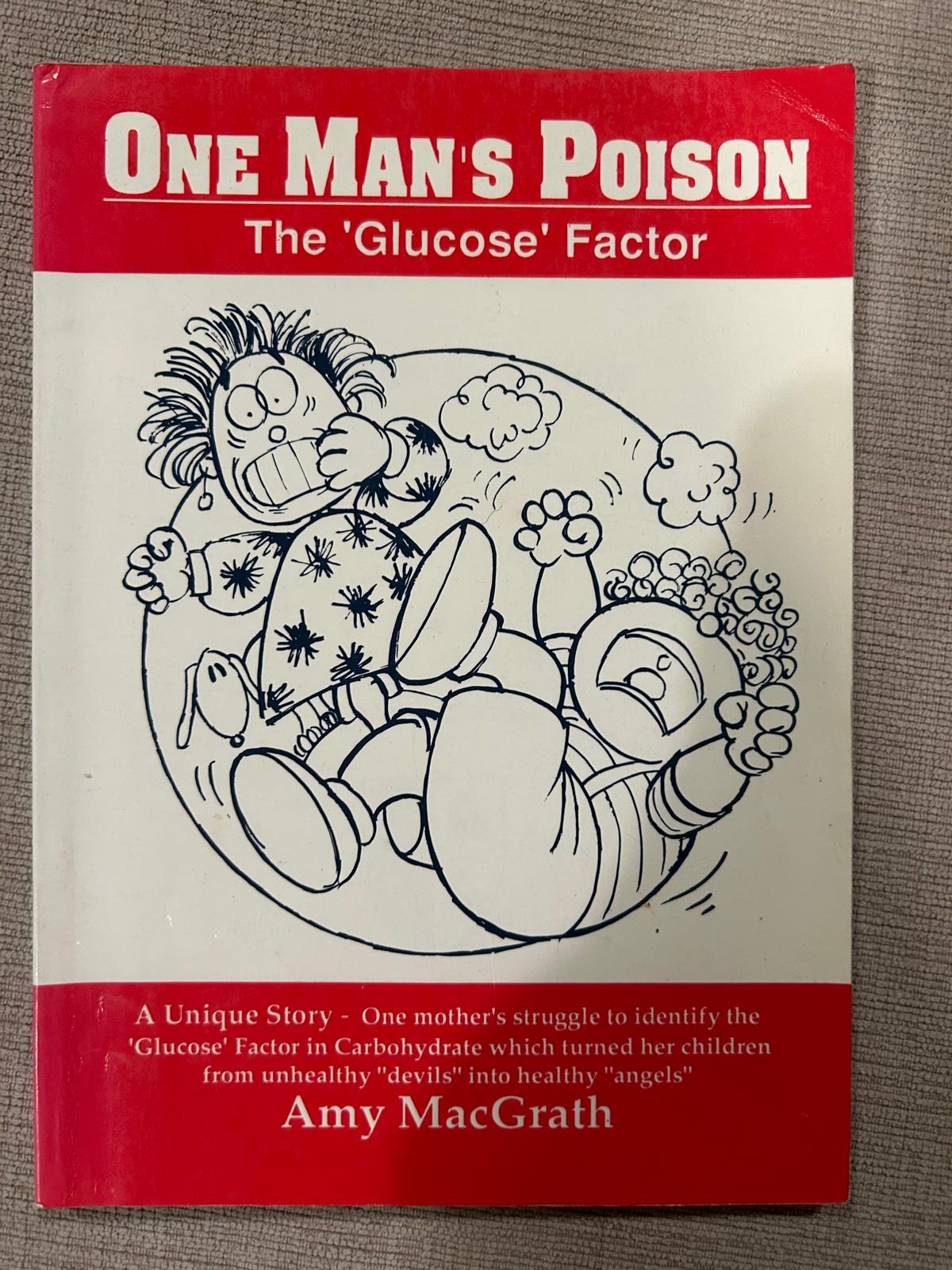It’s astonishing the desire of doctors to quickly label a patient who doesn’t fit their dogma (and ignorance) as psychologically disturbed. “It’s all in the mind,” is an easy get out for doctors who fail. It’s not their lack of skill, apparently; it’s the dumb patient who is messed up in their head.
This phrase inspired the title of a book which TOTALLY transformed my life. It was written by Dr. Richard Mackarness (a British psychiatrist) and published in 1976 (Pan). In the USA it rejoiced under the title Eating Dangerously.
His message was that allergies to food could cause a vast array of symptoms, from asthma, eczema, migraine, arthritis, colitis, to depression, anxiety, disordered behavior and even schizophrenic symptoms. I tried everything he said and it work fully and consistently. I became a born-again food allergist (and saved or changed hundreds of thousands of lives, through clinical work and my books).
Eventually, years later, as a celebrity doctor, I was asked to write a foreword for a reprinting of Mackarness’ book. A rare privilege and a full-circle!
[Mackarness enjoys even greater fame today for his earlier book Eat Fat and Grow Slim, published in 1958 and long predating the low-carb high-fat keto craze]
I myself began publishing books in the genre: The Food Allergy Plan (today published as One Diet For Life), Allergies: What Everyone Should Know (1986) and The Allergy Handbook (1988), to name just a few.
I began getting radio and TV interviews and one of my messages was that “over 70% of the population is allergic to wheat”. That was considered nonsense by orthodox doctors and maybe just a bit intemperate to my colleagues. But over the years, I watched the figure creep up and up. It’s another of those “I told ‘em,” claims, of which I have scores!
Now everyone is jumping on the wagon and we have “Grain Brain” and “Wheat Brain” titles. And lots of books by people who are not doctors and never saw a patient, with titles like: Gluten Intolerance: When Wheat Is The Enemy and Wheat Free, Worry Free: The Art of Happy, Healthy, Gluten-Free Living.
Dr. Stephen Wenger wrote a book Healthier Without Wheat: A New Understanding of Wheat Allergies, Celiac Disease, and Non-Celiac Gluten Intolerance.
Only new to him of course; I was writing about it 40 years ago, but that’s internet publishing for you.
The thing is, I realized early on (1980s), that a lot of people were allergic to wheat but not gluten. How did I know? Simple detective work (I was the world’s “Number One Allergy Detective”, remember). If a person can tolerate rye and barley but not wheat, they are NOT sensitive to gluten!
Moreover, quite a few people are sensitive to gluten but do not get celiac disease. So while doctors go banging on about gluten and claiming that only about 1% of the population are sensitive to gluten, they are failing to help the vast majority of people who are in trouble with grains, notably (but not exclusively) wheat.
Now in case you are wondering what got me started on this, it’s an article in the doctors’ press [MedPage Today. October 28, 2025]. It stated:
Self-reported symptoms from eating gluten or wheat were reported by 10% of individuals without celiac disease or wheat allergy in a meta-analysis.
This sensitivity was significantly more common in women and was associated with anxiety, depression, and irritable bowel syndrome.
The findings suggested that psychological factors and the gut-brain axis play the central role in the pathophysiology rather than being related to the immune system, as in celiac disease. Self-reported symptoms from eating gluten or wheat are common around the world in individuals without celiac disease or wheat allergy, a meta-analysis showed.
The pooled prevalence of self-reported non-celiac gluten/wheat sensitivity (NCGWS) in the general population was 10.3% (95% CI 7.0-14.0), with a wide range in prevalence across countries, from 0.7% in Chile to 23% in the U.K. and 36% in Saudi Arabia.
U.S. prevalence came in at about 5.0% (all this reported in a journal called, appropriately Gut).
Notably, NCGWS was significantly more common in women and was associated with anxiety, depression, and irritable bowel syndrome… wait for it: “suggesting that psychological factors and the gut-brain axis play the central role in the pathophysiology of NCGWS,” the researchers wrote.
So… back to square one. Patients who are not gluten sensitive or wheat allergic are not permitted to have symptoms. They are WRONG and so must be psychologically disturbed. So say the quacks.
What’s a stylish word meaning the opposite of erudite? Let me see… Not like me to run out of words! Oh well, just bone-deep stupid will suffice.
Sounds good though: Rigorous double-blind, placebo-controlled, crossover gluten challenge has turned up a strong nocebo effect. “Although self-reported NCGWS may not always represent true sensitivity to gluten or wheat, it reflects the burden of symptoms attributed to these dietary components in the general population,” the researchers noted.
Nocebo means “belief in harm”, whereas placebo means “belief in good,” or pleasing (from the words noxious and placere, Latin: to please).
The study re-evaluated 25 studies published between 2014 and 2024 with a total of 49,476 participants from 16 countries who were assessed with self-administered, postal, or online questionnaires in community-based settings.
The most common symptoms self-reported were bloating (71.0%), abdominal discomfort (46.0%), abdominal pain (36.0%), and fatigue (32.1%). And folks: THOSE ARE PROBABLY THE TOP 4 SYMPTOMS OF AN ALLERGY TO FOOD(S), in terms of frequency.
It doesn’t need to be wheat, or a grain, by the way. ANY food allergy or intolerance can mess up your gut and if you think about it, these are just the most likely reactions. I discovered for myself that I was allergic to wheat around 1983. If I ate wheat I felt frequently tired, like I’m working too hard, I need a holiday, etc. But if I stayed off wheat, my energies surged, I felt 10 – 15 years younger and people would comment and ask me what I was on! They still do, at age 80!!
And it doesn’t need to be allergy or sensitivity. Rather, many patients’ symptoms attributed to gluten could actually be triggered by fermentable oligosaccharides, disaccharides, monosaccharides, and polyols (FODMAPs), particularly fructans, which are commonly found in wheat-based foods like bread.
Maltose
Let me share something else I learned over the years (I learned most from patients, not from doctors and scientists!) I got some of the details from my friend Prof. Amy MacGrath (see her book One Man’s Poison) and lots of insights from my wonderful patients in Dublin, who make THE BEST bread:
I’m talking about proper time to allow fermentation and leavening in bread making. It’s CRUCIAL and almost nobody seems to understand.
Long dough methods involve extended fermentation, often lasting many hours (e.g., 12 to 24 hours or more) at cool temperatures, typically using a minimal amount of commercial yeast or a natural sourdough starter. In contrast, short dough methods, common in modern industrial baking, use a larger quantity of yeast to achieve a rapid rise, with fermentation times often as short as 1.5 to 2 hours.
The key difference for digestion lies in the extended time the dough’s enzymes and microorganisms (like yeast and lactic acid bacteria) have to work. During fermentation, the flour’s amylase enzymes break down complex starches into simpler sugars, including maltose. Amy MacGrath found maltose a big no-no for her and her family (hence her book, published 1992. I have no idea if it’s available today)
These sugars are then further consumed by the yeast and bacteria to produce carbon dioxide (for leavening) and various organic compounds that enhance flavor and break down potentially irritating components.
Many people who consider themselves intolerant of bread find they can take it, if it’s produced by the long dough method.
And here’s another tip: don’t say I don’t lay it on some weeks! Haha!
You can get a similar effect by soaking grain flours overnight. It starts the fermentation process and then you can cook with it next day. I learned to really LOVE Irish soda bread (made fresh daily, without yeast, using baking soda as a raising agent).
Anyway, back to the dodos (briefly)…
“Following a gluten-free diet without medical or dietetic oversight is associated with an increased risk of nutritional deficiencies, psychological burden, and unnecessary economic cost,” said the article. Yeah, yeah…
“A detailed assessment of both physical and psychological factors… is therefore essential to avoid unnecessary dietary restrictions.” Notice it in there again: psychological factors. Chances are the patient is a kook, type of medicine, isn’t it?
To your good health,
Prof. Keith Scott-Mumby
The Alternative Doctor
SOURCE:
- https://www.medpagetoday.com/allergyimmunology/allergy/118183






